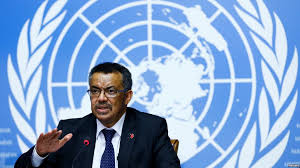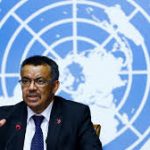By Asma’u Ahmad
The World Health Organisation (WHO) has advised governments to ensure that schools and playgrounds are constructed away from busy roads, factories and power plants to reduce children’s exposure to air pollution.
Dr Tedros Ghebreyesus, the WHO Director-General, gave the advice in a New WHO Report on “Air pollution and child health”, released by the organisation on Wednesday.
The report was launched on the eve of WHO’s First Global Conference on Air Pollution and Health holding at the WHO Headquarters in Geneva from Oct. 30 to Nov. 1.
The WHO director-general noted that busy roads, factories and power plants were major sources of air pollution, stating that constructing schools away from these would limit children’s exposure to polluted air.
He said that around 93 per cent of the world’s children under 15 years breathe air that is so polluted and puts their health and development at risk everyday.
Ghebreyesus said that tragically, many of these children die as WHO estimates in 2016 showed that 600,000 children died from acute lower respiratory infection caused by polluted air.
“Polluted air is poisoning millions of children and ruining lives; this is inexcusable. Every child should be able to breathe clean air so that they can grow and fulfill their full potential.
“One reason why children are particularly vulnerable to the effects of air pollution is because they breathe more rapidly than adults and so absorb more pollutants.
“They also live closer to the ground where some pollutants reach peak concentrations and this is a time when their brains and bodies are still developing.
“The new report reveals that when pregnant women are exposed to polluted air, they are more likely to give birth prematurely and have small, low birth-weight children.
“Air pollution impacts neuro-development and cognitive ability, and can trigger asthma and childhood cancer.
“Children who have been exposed to high levels of air pollution may be at greater risk for chronic diseases such as cardiovascular diseases later in life,” the WHO director-general said.
The report further revealed that air pollution was one of the leading threats to child health accounting for almost one in 10 deaths in children under five years.
According to the report, more than 40 per cent of the world’s population, which includes one billion children under 15 years, is exposed to high levels of household air pollution.
“This pollution comes mainly from cooking with polluting technologies and fuels.
“In low and middle-income countries around the world, 98 per cent of all children under five are exposed to ambient fine Particular Matter (PM2.5) levels which is above WHO air quality guidelines as against 52 per cent in high-income countries,” the report read in part.
The UN health body therefore urged countries to work towards meeting the WHO global air quality guidelines to enhance the health and safety of children.
The organisation said governments should reduce over-dependence on fossil fuels, invest in improving energy efficiency and facilitate the uptake of renewable energy sources to achieve this.
WHO said that better waste management methods should also be adopted which could include reducing the amount of waste burned within communities in order to reduce ‘community air pollution’.
The three-day conference aims to provide opportunities for world leaders, ministers of health, energy and environment, mayors, scientists, heads of intergovernmental organisations and others to commit to act against air pollution.



